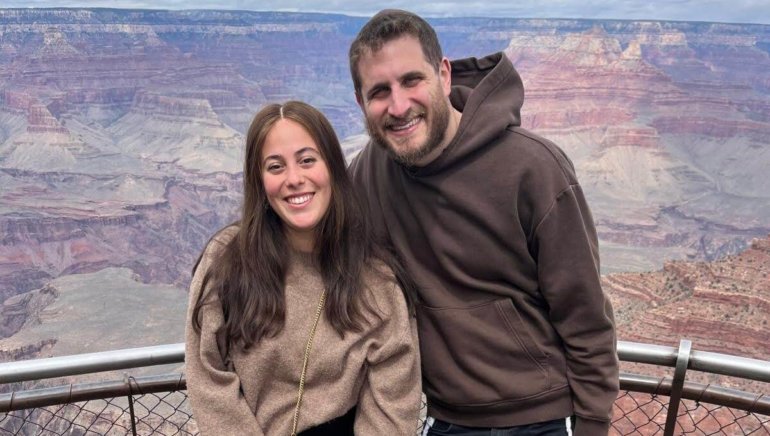
This Chabad Rabbi Left the Wall Street Journal to Build a Radical New Model of Giving Charity
Shalom Goodman never planned to start a nonprofit. He had made it, career-wise—working his dream job as an SEO editor at The Wall Street Journal, helping shape stories for one of the most influential publications in the world. But long before that, Shalom’s life was already being shaped by something deeper: the challenges he faced and learned from.
He grew up in Chicago in a baal teshuvah Chabad family, where Judaism was chosen with love and intention. At age two, he began to stutter—a challenge that might have silenced others but, for Shalom, became a source of resilience and deep compassion.
“It helped me,” he says. “It automatically fills you with deep empathy. I’ve experienced what it’s like to be overlooked, or underrated. I get interrupted. I get laughed at. That’s every day.” Life threw other curveballs too. He went through two broken engagements—painful, humbling experiences that he now sees as necessary parts of his story. Today, Shalom is happily married to Lilach, and they recently welcomed a son, Elisha—named in memory of Elisha Loewenstern Z”l, an IDF soldier who fell in battle.
That emotional depth—the lived experience of being dismissed, unseen, and still choosing to show up with kindness—would become the foundation of everything Shalom does.
One afternoon, just before a Jewish holiday, a text came in from a rabbi Shalom knew. He was in crisis, unsure how he’d make it through the chag. Shalom didn’t hesitate. He posted a request online asking if anyone could help. 18 minutes later, $5,000 had been raised.
“I didn’t have a plan,” he remembers. “He needed help, and we helped.” A friend watching it all unfold said to him: “That was amazing. Is that it? You need to expand this.”
That moment became a turning point. While still working full-time at The Wall Street Journal, Shalom began building what would soon become Collective Kindness.
“I was optimizing headlines and editing part of the day,” he says. “And then in the evenings, I was editing a lot of lives. And I’m like, I want to help hundreds.”
He launched Collective Kindness in 2023 to do just that—with a mission as clear as it is radical: to help Jewish families get back on their feet by assisting them in achieving long-term emotional and financial stability. And in August 2024, he left the Journal to dedicate himself to it full time.
Unlike traditional charities that require you to hit rock bottom to qualify, Collective Kindness is built for the “in-betweeners”—those holding it together on the outside while quietly drowning on the inside. Families facing mounting debt, painful divorces, job loss, or children in emotional crisis with no access to support.
“We’re not just giving people a fish,” Shalom says. “We’re giving them a rod.” This holistic, dignity-first approach offers real tools for long-term stability: career mentorship, job placement, business coaching, housing support, therapy referrals. It’s about building self-sustaining cycles of health—so families are able to grow from their challenges.
“If you walk into the ER in pain and they hand you an aspirin, you might feel better for an hour,” he says. “But you need an X-ray. You need someone to actually assess what’s really going on.”
And that’s exactly what Collective Kindness does with tremendous success. In less than two years, they’ve raised over $1.1 million and helped more than 135 families—preventing evictions, guiding career transitions, and supporting emotional healing with discretion and care.
Shalom’s journey to this work didn’t begin in a nonprofit office. He received rabbinic ordination, but his calling took a different turn. Drawn to writing and editing, he began by offering SEO help to Chabad.org, which led to roles at Business Insider, and ultimately, The Wall Street Journal—all without a journalism degree.
At the Journal, he quickly became known not just for his editorial expertise, but for something else too: his identity. Around the office, he became “the rabbi.” At first, he resisted the label.
“I wanted this image as I’m an expert in SEO,” he says. “But I had an awakening. I’m in the office, and I have to own who I am as a Jew. People love a Jew who respects himself or herself.” That became part of his broader mission: to live proudly and visibly as an Orthodox Jew—and to show others they can too.
“Orthodox Jews aren’t just part of one specific career set or skill set,” he says. “We are everywhere—and we can be everywhere. And as long as we’re proud of who we are, that’s what really matters. People will respect us for it.”
Now, through Collective Kindness, he’s helping others live with that same sense of dignity and support. For every person who reaches out—or whose friend calls on their behalf—Shalom’s team shows up with warmth, discretion, and long-term support.
“Not everyone needs a check,” he says. “Some people need a job. Some people need guidance.”
But everyone needs to be seen. And that’s what Shalom does best. At the end of the day, all of his titles—rabbi, editor, founder—come second. “The most important thing,” he says, “is being a mensch. That’s it.”
If you found this content meaningful and want to help further our mission through our Keter, Makom, and Tikun branches, please consider becoming a Change Maker today.








3 comments
Sort by
I would love to participate in this with my 16-year-old son will be a senior in high school. We are not orthodox, but we are conservative and keep Kosher home. We live in Dix Hills NY.
We would love to start helping immediately as we do have some time this summer please have someone to reach out to me
Collective Kindness sounds amazing! It sounds a lot like an Israeli organization named Lema’an Achai.
These 2 organizations should get together!
Very good mission!!!!!!